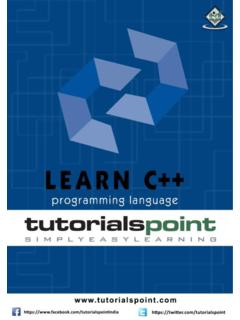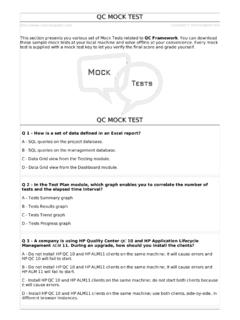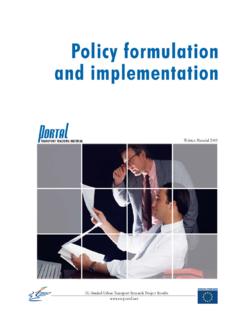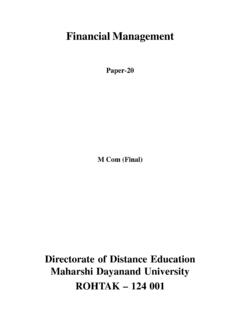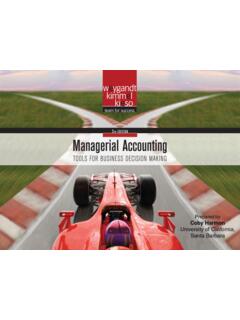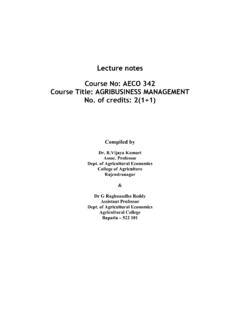Transcription of Managerial Economics - Tutorialspoint
1 Managerial Economics 1 Managerial Economics i About the Tutorial Managerial Economics is concerned with the application of economic concepts and economic analysis to the problems of formulating rational Managerial decisions. This tutorial covers most of the topics of Managerial Economics including micro, macro, and Managerial economic relationship; demand forecasting, production and cost analysis, market structure and pricing theory. Audience This tutorial is aimed at management students having a basic understanding of business concepts. It will give them an in-depth overview of the major topics of Managerial Economics . Prerequisites It is an elementary tutorial and you can easily understand the concepts explained here with a basic knowledge of management studies.
2 Copyright & Disclaimer Copyright 2015 by Tutorials Point (I) Pvt. Ltd. All the content and graphics published in this e-book are the property of Tutorials Point (I) Pvt. Ltd. The user of this e-book is prohibited to reuse, retain, copy, distribute or republish any contents or a part of contents of this e-book in any manner without written consent of the publisher. We strive to update the contents of our website and tutorials as timely and as precisely as possible, however, the contents may contain inaccuracies or errors. Tutorials Point (I) Pvt. Ltd. provides no guarantee regarding the accuracy, timeliness or completeness of our website or its contents including this tutorial.
3 If you discover any errors on our website or in this tutorial, please notify us at Managerial Economics ii Table of Contents About the Tutorial .. i Audience .. i Prerequisites .. i Copyright & Disclaimer .. i Table of ii PART 1: INTRODUCTION .. 1 1. Managerial Economics AN OVERVIEW .. 2 Managerial Economics Definition .. 2 Micro, Macro, and Managerial Economics Relationship .. 2 Nature and Scope of Managerial Economics .. 2 Role in Managerial Decision Making .. 5 2. BUSINESS FIRMS AND BUSINESS DECISIONS .. 6 Steps for Decision Making .. 6 Sensitivity Analysis .. 7 3. ECONOMIC ANALYSIS & 8 Optimization Analysis .. 9 Total Revenue and Total Cost Approach.
4 9 Marginal Revenue and Marginal Cost Approach .. 9 4. REGRESSION TECHNIQUE .. 11 Simple Regression .. 11 Multiple Regression Analysis .. 15 PART 2: DEMAND FORECASTING .. 17 5. MARKET SYSTEM & 18 The Economic Systems .. 18 Demand and Supply Curves .. 18 6. DEMAND & ELASTICITIES .. 21 Changes in Demand .. 21 concept of Elasticity .. 21 Elasticity of Demand .. 22 Factors Affecting Price Elasticity of Demand .. 23 Cross Elasticity of Demand .. 24 Total Revenue (TR) and Marginal Revenue .. 24 Price Ceiling and Price Flooring .. 25 7. DEMAND FORECASTING .. 27 Demand .. 27 Law of Demand .. 27 Theory of Consumer Behavior .. 28 Marginal Utility Analysis.
5 29 Indifference Curve Analysis .. 30 Managerial Economics iii Consumer Equilibrium .. 31 PART 3: PRODUCTION & COST ANALYSIS .. 33 8. THEORY OF PRODUCTION .. 34 Function .. 34 Production Analysis .. 34 Cost Function .. 35 Law of Variable Proportions .. 36 9. COST & BREAKEVEN ANALYSIS .. 39 Cost Concepts .. 39 Future and Past Costs .. 39 Incremental and Sunk Costs .. 39 Types of Costs .. 41 Determinants of Cost .. 41 Short-Run Cost-Output Relationship .. 42 Long-Run Cost-Output Relationship .. 42 Economies and Diseconomies of Scale .. 42 Contribution and Breakeven Analysis .. 43 Breakeven chart .. 44 PART 4: MARKET STRUCTURE & PRICING THEORY .. 46 10.
6 MARKET STRUCTURE & PRICING DECISIONS .. 47 Market Structure .. 47 Perfect Competition .. 47 Pricing Decisions .. 48 Monopolistic Competition .. 48 Monopoly .. 49 Oligopoly .. 50 11. PRICING STRATEGIES .. 51 Pricing a New Product .. 51 Multiple Products .. 52 Full Cost Pricing Method .. 52 Marginal Cost Pricing Method .. 52 Transfer Pricing .. 52 Dual Pricing .. 53 Price Effect .. 53 Substitution Effect .. 54 Income Effect .. 54 PART V: CAPITAL BUDGETING .. 55 12. INVESTMENT UNDER CERTAINTY .. 56 Non-Discounted Cash Flow .. 56 Discounted Cash Flow Techniques .. 57 Profitability Index (PI) .. 58 Managerial Economics iv Internal Rate of Return (IRR).
7 59 13. INVESTMENT UNDER UNCERTAINTY .. 61 Statistical Techniques for Risk Analysis .. 61 PART VI: MACROECONOMIC ASPECTS .. 63 14. MACROECONOMICS BASICS .. 64 Nature of Macroeconomics .. 64 Scope of Macroeconomics .. 64 15. CIRCULAR FLOW MODEL OF ECONOMY .. 66 16. NATIONAL INCOME AND MEASUREMENT .. 68 Definition of National Income .. 68 Measures of National Income .. 68 Methods of Measuring National Income .. 70 17. NATIONAL INCOME DETERMINATION .. 71 Factors Determining the National Income .. 71 18. MODERN THEORIES OF ECONOMIC GROWTH .. 72 Definition of Economic Growth .. 72 Theories of Economic Growth .. 72 19. BUSINESS CYCLES AND STABILIZATION .. 74 Theories of Business Cycles.
8 74 Stabilization Policies .. 75 Instruments of Stabilization Policies .. 75 20. INFLATION & ITS CONTROL MEASURES .. 76 Inflation .. 76 Causes of Inflation .. 76 Measures to Control 76 Impact of Inflation on Managerial Decision Making .. 77 Managerial Economics 1 PART 1: INTRODUCTION Managerial Economics 2 A close interrelationship between management and Economics had led to the development of Managerial Economics . Economic analysis is required for various concepts such as demand, profit, cost, and competition. In this way, Managerial Economics is considered as Economics applied to problems of choice or alternatives and allocation of scarce resources by the firms.
9 Managerial Economics is a discipline that combines economic theory with Managerial practice. It helps in covering the gap between the problems of logic and the problems of policy. The subject offers powerful tools and techniques for Managerial policy making. Managerial Economics Definition To quote Mansfield, Managerial Economics is concerned with the application of economic concepts and economic analysis to the problems of formulating rational Managerial decisions. Spencer and Siegelman have defined the subject as the integration of economic theory with business practice for the purpose of facilitating decision making and forward planning by management.
10 Micro, Macro, and Managerial Economics Relationship Microeconomics studies the actions of individual consumers and firms; Managerial Economics is an applied specialty of this branch. Macroeconomics deals with the performance, structure, and behavior of an economy as a whole. Managerial Economics applies microeconomic theories and techniques to management decisions. It is more limited in scope as compared to microeconomics. Macroeconomists study aggregate indicators such as GDP, unemployment rates to understand the functions of the whole economy. Microeconomics and Managerial Economics both encourage the use of quantitative methods to analyze economic data.

